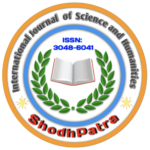| Article Title |
Swami Vivekananda Impact on Modern Indian Society and Culture |
| Author(s) | Alauddin Middya, Prof. Dr. Bimal Mandal. |
| Country | India |
| Abstract |
Swami Vivekananda’s impact on modern Indian society and culture remains both profound and enduring. A visionary thinker and spiritual reformer, Vivekananda revitalized Indian consciousness by promoting self-confidence, universal brotherhood, and the untapped potential within every individual. His groundbreaking address at the Parliament of the World’s Religions in 1893 not only introduced Indian spiritual philosophy to a global audience but also instilled a renewed sense of national pride and purpose among Indians. His teachings catalyzed the emergence of modern Indian thought, inspiring social reform, educational innovation, and a movement toward self-reliance. Today, Vivekananda’s legacy continues to shape cultural discourse and social policies in India, influencing contemporary efforts in education, community development, and ethical leadership. His emphasis on holistic growth—integrating spiritual wisdom with modern scientific inquiry—remains a cornerstone for initiatives aimed at fostering inclusivity, resilience, and progress. As modern India navigates the challenges of globalization and rapid technological change, Vivekananda’s enduring vision offers a unifying framework for nurturing a society that honors its rich heritage while embracing transformative innovation. |
| Area | Education |
| Issue | Volume 2, Issue 3, March 2025 |
| Published | 29-03-2025 |
| How to Cite | Middya, A., & Mandal, B. (2025). Swami Vivekananda Impact on Modern Indian Society and Culture. ShodhPatra: International Journal of Science and Humanities, 2(3), 49-59. |
ShodhPatra: International Journal of Science and Humanities

 View / Download PDF File
View / Download PDF File